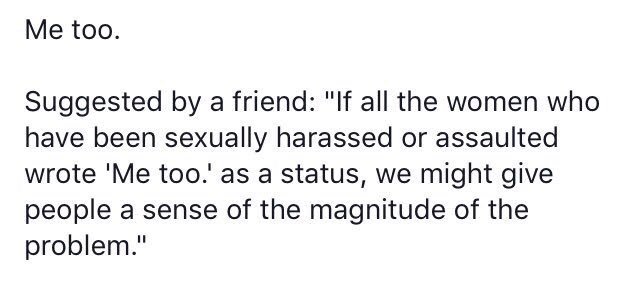http://www.michaelwhitehouse.org/2017/10/on-me-too.html?m=1
Monday, October 16, 2017
On "Me Too"

I had three reactions to the "Me Too" meme going around the internet. For those who are not aware of this movement, you can read about it here, but basically the concept is that any woman who has ever been sexually harassed, assaulted or raped can post "me too" and it will let people see just how pervasive of a problem it is.
For those who are familiar with the problem, it is no surprise that most Facebook feeds now are just a stream of "me too"s, but for many this is an eye opening phenomenon.
Personally, I had three reactions to it. My immediate reaction was anger that this happens in the world.
My second reaction, a little bit later, was to realize that, since this happens to almost every woman in America, one day my daughter will likely be posting "me too" to her own status some day in the future.
My third reaction was the realization that someone may be posting "me too" because of something I have done at some point in the past.
Frankly, every man should be considering that third reaction. Even if they think that they never harassed anyone, they should still think about it. Why? Because there are plenty of things that a man might do with innocent intentions that could leave a woman feeling uncomfortable or even scared. Complements on her body or clothes. Suggestions of sexual acts. Even crude jokes. Behavior that might be fun and playful around friends can be downright terrifying from a stranger or an acquaintance.
For me, however, I know I have done things wrong. I know when, but interestingly, I do not know to whom, and that gets to the root of the problem for many men.
A bit over a decade ago, when I was in my mid-20s, I was in leadership of a Rocky Horror Picture Show shadow cast. It was a fun and flirty group. There was a great deal of casual affectionate contact, and, being young and foolish, I subscribed to the school of thought that if she didn't complain then everything was fine. This is not correct, as I now know, especially because I had the power to determine who got on stage and who did not.
We're talking about relatively causal contact: hugs, back rubs, etc. But when the director who decides if you're on stage next week starts rubbing your back, and you'd rather he didn't you have to weigh your discomfort against your desire to perform. I would never have made a casting decision based on something like that (there was a strict guideline I followed to remove various forms of bias), but how would she know that?
Some people did express concerns, but the people who were willing to step forward were people that I already had some conflict with, and they brought it up in the context of "and here's another thing you do wrong," but since they wouldn't provide names of who was uncomfortable, I thought it was just politics.
Of course, I made an effort to talk to some women about it, but the women I would be able to talk to openly were the ones I was closer with, thus the ones who would not be made uncomfortable. And when I asked those whom I was not close with, some of whom I was making uncomfortable, they would just brush it off and say it was fine.
In the end, of course, I did learn my lesson, and I learned it when I was removed from leadership by a cast-wide vote, but even then, for over a year after, I blamed politicking and conspiracies rather than understanding what my role in it had been.
So, why do I tell this story. I tell it because I believe that the solution to the problem is very different from what many people think it is. If the problem is being caused by predators who prey on the vulnerable than the solution is punishment, but if the problem is that there are men who simply don't realize they are doing anything wrong, then the solution is engagement and education. Worse, men who believe themselves to have done nothing wrong facing punishment will seek to defend themselves and will enlist the support of any allies they can, creating and promoting the narrative of vindictive prosecution and false accusations.
It's much easier to accept that you have ignorance to address and that your ignorance is hurting people than to be called a predator and a harasser and an abuser.
I hope that most people who know me would not think that I am a predator or a misogynist, but I was very much at one time ignorant, and it was not until my late 20s that I overcame that ignorance.
There are predators out there who know they are doing wrong, and those men should be punished, but I honestly feel that the vast majority of harassers simply are not aware of their transgressions. Fortunately, I think that this "me too" meme will do a lot to start the conversation, and a lot of education can come from it. First, there must be awareness before there can be any change.
No comments:
Post a Comment